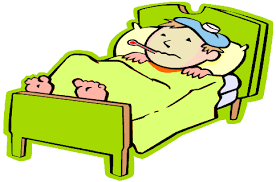Conversation A
對(duì)話A
Rob: Welcome to the show, Dr. Apple Day!
羅布:Apple Day醫(yī)生,歡迎來(lái)到我們的節(jié)目!
Apple: Please, just call me Apple.
蘋(píng)果:請(qǐng)叫我蘋(píng)果就好。
Rob: Sure. So, Apple, you're a doctor. Let's talk about winter sicknesses.
羅布:好的。那么蘋(píng)果,你是一名醫(yī)生。我們一起談?wù)劧斓募膊“伞?/div>
Apple: OK. In the winter, people often get colds.
蘋(píng)果:好的。人們通常會(huì)在冬天感冒。
Rob: I don't like colds. They block your nose.
羅布:我不喜歡感冒。會(huì)讓我鼻塞的。
Apple: Yes. And you often get a sore throat, too.
蘋(píng)果:是的。另外你還經(jīng)常會(huì)嗓子疼。

Conversation B
對(duì)話B
Rob: People can also get the flu in winter.
羅布:人們還會(huì)在冬天得流感。
Apple: Yes. Colds aren't nice. But the flu is worse.
蘋(píng)果:是的。感冒就不太好了。但是流感會(huì)更糟。
Rob: The flu can cause bad headaches.
羅布:流感會(huì)引起嚴(yán)重的頭疼。
Apple: Yes. And you often get a fever with the flu.
蘋(píng)果:是啊。而且流感經(jīng)常會(huì)引起發(fā)燒。
Rob: I usually feel very warm and uncomfortable with the flu.
羅布:我得流感的時(shí)候通常會(huì)感覺(jué)全身發(fā)熱、不舒服。
Apple: Exactly, Rob. The fever makes you hot.
蘋(píng)果:沒(méi)錯(cuò),羅布。發(fā)燒會(huì)讓你發(fā)熱的。
Conversation C
對(duì)話C
Rob: What can we do about winter colds and the flu, Apple? Can we take some medicine?
羅布:蘋(píng)果,關(guān)于冬天的感冒和流感,我們能做什么呢?我們可以吃一些藥物嗎?
Apple: Yes, medicine can help. But you have to rest. That is very important.
蘋(píng)果:可以,藥物會(huì)有作用的。但是你必須要休息。這一點(diǎn)很重要。
Rob: You can't go to work or school?
羅布:不能去上班或是上學(xué)吧?
Apple: Exactly. Stay at home.
蘋(píng)果:沒(méi)錯(cuò)。待在家里。
Rob: So you get better?
羅布:這樣才會(huì)康復(fù)?
Apple: Yes. And so you don't give other people your sickness.
蘋(píng)果:是啊。而且這樣你不會(huì)把病傳染給其他人。











